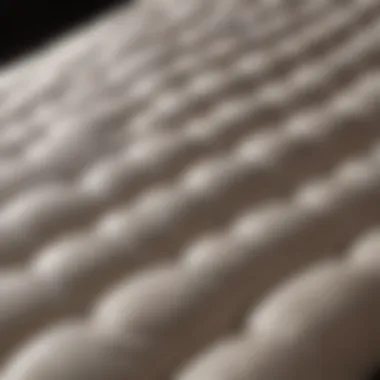Optimal Sleeping Solutions: Best Futon Mattress Picks


Intro
Choosing the perfect futon mattress is often more than just a practical decision; it’s about crafting a space that reflects your style while ensuring restful sleep. Futons have become popular not only for their versatility but also for their ability to adapt to small living areas, making them a favored choice among urban dwellers and families alike. When pondering the ideal futon mattress, several factors come into play—materials, comfort, adaptability, and maintenance. These considerations form the backbone of our quest for optimal sleep solutions.
As we dive deeper into this topic, we will explore current trends in futon mattress design and functionality. From aesthetic choices to practical features, the right mattress can significantly enhance your sleeping experience.
Let’s embark on this journey to uncover the essentials of selecting a futon mattress that suits your lifestyle and enhances your living space.
Understanding Futon Mattresses
Futon mattresses serve as a fundamental component in enhancing sleeping quality and optimizing living spaces. It’s vital to gain a deep understanding of what these mattresses are and how they cater to diverse needs. Often mistaken for ordinary mattresses, futons bring a unique blend of functionality and design. They can transform any environment, whether it be a compact apartment or a spacious guest room, into a restful retreat.
The sheer versatility of futon mattresses is one of their distinguishing features. They can function as seating during the day and seamlessly convert into a comfortable sleeping solution by night. This adaptability can be particularly beneficial for homeowners with limited space or for those who require a guest bed that can be easily stored when not in use. In essence, futons not only provide comfort but also offer innovative solutions for multi-functional living.
Historical Context of Futons
The origins of futons can be traced back to Japan, where they were first used as bedding over a thousand years ago. The traditional Japanese shikibuton—simple, thin cotton mattresses—provided a practical and effective sleep solution. Unlike bulky Western mattresses, these thin futons could be easily folded and stored, making them an ideal choice in homes where space was at a premium.
The use of futons in Japan reflects cultural preferences for minimalism, functionality, and a connection to the earth. The designs have since evolved, yet the underlying principles remain intact. With Western cultures adopting futons, they have undergone numerous transformations, incorporating various materials and aesthetics, widening their appeal significantly. It’s fascinating to note that even today, the simplicity and historical richness surrounding futons continue to attract consumers who appreciate a blend of tradition with modern comfort.
Current Trends in Futon Usage
Presently, futon mattresses have found their stride in contemporary interior design, signaling a shift towards more adaptable, eco-friendly, and budget-conscious sleeping options. Many individuals are drawn to these mattresses for their potential to serve multiple purposes without sacrificing comfort.
Homeowners are increasingly opting for futons with hybrid materials, combining natural fibers like cotton and wool with advanced synthetic components for enhanced support. This trend reflects a broader emphasis on sustainable practices and organic living.
Furthermore, minimalism has resurged as a lifestyle choice, with many embracing less clutter and more functionality in their homes. Futons cater well to this ideology, marrying form with function effortlessly. Notably, you also see an increased interest in aesthetic appeal. Futon designs are becoming more stylish, featuring a plethora of colors, patterns, and textiles, making them suitable for not just functionality but also as statement pieces in a room.
As consumers acquire a better understanding of sleep health, finding a mattress that can cater to personal needs has taken precedence. Futons offer multiple sleeping solutions without compromising on comfort or style.
"In a world where space is a luxury, futon mattresses present a clever way to utilize limited areas while ensuring every night is a good night's sleep."
By grasping the context and current trends in futon mattresses, individuals can make informed choices that enhance both their living conditions and sleeping arrangements.
Materials Used in Futon Mattresses
When selecting a futon mattress, the materials used in its construction are pivotal to its comfort, durability, and overall performance. Each material has its own unique properties, influencing how well it supports the body, regulates temperature, and holds up over time. Understanding the nuances of these materials helps you make an informed decision that fits your sleeping habits and lifestyle needs.
Natural Fibers
Natural fibers have long been a favored choice for those seeking a traditional and organic sleeping experience. Cotton, wool, and hemp are commonly used, each providing distinct benefits.
- Cotton is breathable and soft, offering a cozy feel while helping with moisture absorption. This keeps the sleeping surface dry, which can be particularly valuable in warmer climates or for those prone to sweating during the night.
- Wool has the remarkable ability to regulate temperature, keeping you cool in summer and warm in winter. It also possesses natural resistance to dust mites and mold, making wool-filled mattresses a preferable option for allergy sufferers.
- Hemp fibers are incredibly durable and environmentally friendly, offering a sustainable choice for eco-conscious consumers.
Natural fibers tend to provide a firmer feel, which can be advantageous for back health, but some may find them less plush compared to synthetics.
Synthetic Materials
On the other side of the spectrum are synthetic materials, often designed to enhance certain features of the futon mattress, like durability, water resistance, and overall affordability. Common synthetic materials include polyester and polyurethane foam.
- Polyester is cost-effective and easy to clean, making it a good selection for busy households. Its lightweight properties also aid ease of handling and transportation.
- Polyurethane foam is noted for its ability to conform to the body, acting as a supportive layer while dispersing weight evenly. This cushioning effect can promote better spinal alignment. However, while many appreciate the comfort of foam, its susceptibility to heat retention can sometimes lead to a warmer sleeping experience.
Synthetic materials can sometimes feel less breathable compared to natural fibers, yet they also offer different levels of customization in terms of firmness and plushness.
Hybrid Options
In recent years, hybrid futon mattresses have surged in popularity, marrying the advantages of both natural and synthetic materials. These mattresses typically feature layers that combine the support of foam with the comfort of natural fibers. For instance, a common arrangement might include a foam core for support, topped with a layer of cotton or wool for enhanced comfort.
- Benefits of Hybrid Mattresses:
- They leverage the body-contouring properties of foam while maintaining breathability through natural fibers.
- Often designed to accommodate a wider variety of sleeping styles and preferences, they can cater to both side and back sleepers comfortably.
While hybrid options can be pricier due to the materials and craftsmanship involved, many users find the perfect balance of comfort and support they desire, providing a versatile solution for varied sleeping needs.
"Choosing the right material is not just about comfort; it’s about attaining that restful oasis you deserve."


By evaluating these materials, one gets a clearer picture of what’s suitable for their sleeping habits, ensuring an optimal sleeping solution tailored to one’s personal preference.
Key Factors for Sleeping Comfort
Selecting a futon mattress that meets your specific comfort needs can feel like searching for a needle in a haystack. It’s a personal journey, where comfort is king, and making the right choices is crucial for quality sleep. In this section, we will explore three key factors contributing to sleeping comfort: firmness levels, support features, and temperature regulation. Each component plays a significant role in your overall comfort and satisfaction.
Firmness Levels
Firmness is a pivotal factor when it comes to sleep quality. It’s not just about what feels comfy to the touch; it's about how well a mattress supports your body while you snooze. Too firm, and you might wake up feeling like you've been sleeping on a rock. Too soft, and your spine may bow like a bent tree. Generally, firmness levels fall between soft, medium, and firm, but how do you know what’s right for you?
- Soft mattresses often let you sink in, giving that cozy embrace. This might be good for side sleepers who need to cushion their shoulders and hips.
- Medium options offer a balance, providing some give while still supporting back and stomach sleepers. A sweet spot many folks appreciate.
- Firm mattresses are usually recommended for those who need extra support for their spine or for heavier individuals. They help keep the body aligned without excess sag.
Consider your personal preferences and sleeping style when evaluating firmness. A good test is the classic method of lying down for a few minutes. If you feel supported without sinking too deep, you might be on the right track.
Support Features
Support is like the backbone of a great sleep experience. It’s about how well the mattress distributes weight and maintains your body’s natural alignment. Think of support features as the architecture behind your sleep sanctuary.
Well-designed futon mattresses can include:
- Zoned Support: Some models feature different zones of firmness, catering to the various pressures exerted by your body. This helps in maintaining a neutral spine while you sleep.
- Edge Support: Certain futons come with reinforced edges, allowing you to sit comfortably without rolling off when you’re getting in or out of bed.
- Pressure Relief: High-quality futons might have layers or components specifically designed to relieve pressure on sensitive areas, like the hips and shoulders.
Evaluating these elements can be the difference between waking up refreshed or with aches and pains. It’s all about ensuring your mattress doesn’t just feel good but also empowers restorative sleep.
Temperature Regulation
Picture this: you’re cozied up for the night, only to wake up drenched in sweat or shivering from chill. Temperature regulation is a critical part of sleeping comfort that often gets overlooked. A futon mattress that traps heat like a hot oven can lead to restless nights.
When considering this factor, look for:
- Breathable Materials: Natural fibers, such as cotton or wool, often allow for better airflow, keeping you cool during those hot summer nights.
- Cooling Technology: Some futons are designed with specific gel layers or breathable foams that help dissipate heat.
- Moisture-Wicking Properties: These can help in keeping sweat at bay, providing a more comfortable sleeping experience.
Finding a mattress that maintains an optimal sleeping temperature will enhance the quality of your rest. When your body can find its perfect sleeping climate, you'll be well on your way to sweet dreams.
"The perfect futon mattress is like a good friend; it knows exactly how to support you without weighing you down."
Understanding these key factors will arm you with the knowledge needed to choose a futon mattress that brings not just comfort but a restorative escape from the daily grind. As you consider your options, keep these elements in mind to create a haven tailored just for your sleep needs.
Types of Futon Mattresses
When exploring the world of futons, understanding the different types of futon mattresses is crucial for making an informed choice. Each type comes with its unique benefits and considerations, impacting how effectively it meets your sleeping and living space needs. Knowing the distinctions between these futon varieties can help you match them with your specific lifestyle requirements and prioritizing comfort.
Traditional Shikibuton
The traditional Shikibuton is a quintessential futon mattress originating from Japan. This style is distinctly thinner and more lightweight compared to Western prevailing mattresses, making it a versatile option for various living conditions. A Shikibuton is usually constructed from natural fibers like cotton, giving it a soft yet firm feel that many find ideal for sleep.
The simplicity of the Shikibuton means it can easily be rolled up and stored away during the day, freeing up floor space in smaller apartments. Some folks liken it to sleeping on a cloud that's been masquerading as a thin layer—comfort is subtle yet present. However, it’s essential to consider the fact that if you require a more cushioned sleeping experience, a Shikibuton may not provide enough support, particularly for those with specific health concerns.
A few noteworthy traits of the Traditional Shikibuton are:
- Easy to Store: Ideal for compact living areas where floor space is premium.
- Eco-Friendly Materials: Often made from sustainable natural fibers, great for the environmentally conscious.
- Cultural Essence: It adds a unique aesthetic to your home that echoes Japanese decor.
"For those who prefer a minimalist lifestyle, the Traditional Shikibuton could well be the perfect fit."
Futon Sofa Beds
Futon sofa beds combine the comfort of a sofa with the functionality of a bed, making them a popular choice for those who prioritize versatility. They are designed to transition effortlessly from couch to sleeping space, making them a champion in multipurpose settings. This type of futon mattress is generally thicker than a Shikibuton, often featuring additional layers for enhanced support.
The beauty of a futon sofa bed lies in its ability to adapt to various occasions—great for hosting sleepovers or accommodating overnight guests without the need for a dedicated guest room. When it comes to stylish appearances, futon sofa beds often come in various designs and fabric choices, providing options that suit most interior design preferences. On the down side, those who require optimal firmness may find some models a bit soft for long-term sleep.
Here are some key aspects of Futon Sofa Beds to consider:
- Versatility: Function as both a couch and bed, optimizing space.
- Varied Styles: Available in numerous designs to match your home's aesthetic.
- Comfort Options: The thicker mattress provides a sleep experience closer to traditional mattresses.
Inflatable Futons
Inflatable futons present a unique solution for temporary sleeping arrangements, often used during travels or for outdoor adventures like camping. These mattresses can be inflated quickly and deflated just as easily, making them extremely portable. They come in various thickness and sizes, some mimicking the plushness you would expect from a conventional mattress.


However, although an inflatable futon may offer decent comfort for short-term use, the longevity and support over time can be questionable. Some users report issues with punctures or leaks if not cared for properly. Keeping that in mind, they can serve a valuable purpose during gatherings and spontaneous overnight plans.
In summation, here are the main features:
- Portability: Entrance to sleep solutions for people always on the move.
- Quick Setup: Easily inflated right when needed, perfect for unexpected guests.
- Cost-Effective: Typically more affordable than traditional options, appealing for budget-conscious shoppers.
Evaluating Futon Mattress Quality
When it comes to futon mattresses, understanding their quality isn’t just for the sake of having a good night’s rest; it's about investing in your sleep health and your living environment. The quality of a futon mattress can significantly impact comfort, durability, and overall satisfaction. The importance of this evaluation stretches beyond mere aesthetics or price tag. It involves delving into how well a mattress supports your body, how long it will last, and how it fits into your unique lifestyle needs.
Industry Standards and Certifications
In a marketplace flooded with options, industry standards and certifications act like a beacon, guiding consumers towards well-made futon mattresses that align with their comfort and safety preferences. Look for certifications such as CertiPUR-US, which ensures that foam is made without harmful chemicals and meets specific safety standards. Other certifications, such as Oeko-Tex Standard 100, indicate that the materials used are free from harmful substances, ensuring that your bed is not only comfortable but also safe for you and your family.
Moreover, checking for compliance with particular guidelines can bolster your confidence. For instance, the American Society for Testing and Materials (ASTM) provides criteria that futon mattresses should meet regarding durability and performance. These standards help in narrowing down your choices to those that promise quality and longevity.
Remember, buying a futon mattress is akin to navigating through a maze; you want to emerge with a product that doesn’t simply meet your expectations but exceeds them.
User Reviews and Ratings
User reviews can offer a treasure trove of insights, shining a light on the real-world performance of futon mattresses. A mattress may look good on paper, but personal anecdotes reveal crucial information about comfort, support, and longevity. Scrutinizing reviews from platforms like Reddit can present a balanced range of experiences. Some users might rave about how a specific model cradles their body like a gentle hug, while others might mention the firmness or lack thereof in a way that resonates with potential buyers.
Additionally, consider aggregating star ratings from reliable sites to get a quick numerical overview of customer satisfaction. High ratings generally indicate that a product is well-received; however, keep an eye out for detailed comments to grasp the nuances.
A few questions to ponder while sifting through reviews include:
- Is the futon mattress maintaining its shape over time?
- Do users report consistent comfort over long periods?
- Are there recurring issues that appear in multiple reviews, such as sagging or durability concerns?
By piecing together this feedback, you can find a futon mattress that aligns with your specific needs and expectations, ensuring a thoughtful decision that ends with better sleep quality.
So, when evaluating a futon mattress, don't just rely on product descriptions—tap into the collective wisdom of other buyers. Their experiences may just guide you to a purchase that's worth its weight in gold.
Adapting Futon Mattresses for Various Spaces
When it comes to optimizing your living environment, the futon mattress stands out as a flexible option that seamlessly fits into diverse spaces. The ability to adapt a futon mattress to different areas not only supports functionality but also adds an aesthetic touch. With growing trends towards minimalist living and multifunctional spaces, understanding how to effectively integrate a futon mattress becomes increasingly relevant. This discussion delves into specific elements, benefits, and considerations regarding the adaptation of futon mattresses.
Compact Living Areas
In compact living areas such as small apartments or studio flats, every square inch counts. Here, the futon mattress shines due to its dual purpose. During the day, it can serve as a couch or lounging area, providing a casual place for relaxation or socializing. Come nighttime, it easily transforms into a comfortable bed.
To maximize space:
- Consider a foldable futon design that allows for easy conversion.
- Look for futons with built-in storage options, such as drawers or compartments, to stash away bedding or cushions.
- Use lighter colors for your futon, which can create an illusion of more space, keeping the overall area feeling airy and open.
Such adaptability not only ensures efficient use of space but also enriches the aesthetic of compact living.
Guest Rooms
Futon mattresses are an excellent choice for guest rooms, particularly when you're short on space or do not frequently entertain visitors. They can effortlessly accommodate overnight guests without the need for bulky traditional beds. The key advantage lies in their versatility. They can be set up swiftly when visitors arrive and tucked away just as easily once they leave.
When setting up a guest room with a futon mattress:
- Choose a high-quality cover that aligns with your guest room’s theme—this enhances visual appeal while ensuring comfort.
- Stock the room with additional pillows and blankets to create a cozy atmosphere.
- Consider investing in a memory foam futon mattress, which offers better support and comfort than standard types, ensuring your guests have a restful sleep.
Having a futon in a guest room helps maintain a welcoming environment while allowing the space to be used for other purposes during non-guest times.
Multi-Purpose Spaces
In today’s world, many homes embrace multi-purpose spaces, often serving as a home office, play area, and relaxation zone all rolled into one. Futon mattresses can play a pivotal role in such environments. They bring flexibility to the area, accommodating a variety of needs throughout the day.
To effectively utilize a futon mattress in multi-purpose spaces:
- Position it strategically where the day-to-day use aligns with major traffic patterns, allowing easy transitions from one function to another.
- Use accessories like stylish throws or decorative pillows to give your futon a polished look during the day while maintaining its comfort for evening use.
- If the area doubles as an office, consider a futon with built-in shelves to utilize vertical space efficiently.
By integrating a futon mattress into multi-purpose areas, you ensure that functionalities do not clash but rather coexist beautifully, optimizing usability without compromising on style.


"Maximizing adaptability in home environments is not merely a trend but a necessity in contemporary living."
Ultimately, adapting futon mattresses to various spaces enhances their usability, making them an ideal solution for modern households. This flexibility can significantly elevate both the functionality and the aesthetic appeal of your living areas.
Care and Maintenance of Futon Mattresses
Taking proper care of your futon mattress is essential for ensuring not only its longevity but also your overall comfort while you sleep. Many people overlook this aspect, thinking that a simple shake or a quick fluff is all that's needed. However, just like any other piece of furniture, futon mattresses require a bit of attention to maintain their freshness and functionality. By keeping your futon in top-notch condition, you can enjoy a good night's sleep without the added concern of allergens, wear, and tear.
Cleaning Techniques
The cleanliness of your futon mattress is paramount. Accumulation of dust mites, allergens, and stains can detract from its comfort. To clean your futon, you might want to consider the following techniques:
- Regular Vacuuming: Grab your vacuum cleaner with an upholstery attachment. This is an easy and effective way to remove dust and microscopic pests. Aim for a thorough vacuum at least every month.
- Spot Cleaning Stains: In case of spills or stains, act fast. Use a soft cloth and a mixture of mild soap and water to gently dab the area. Avoid soaking the fabric too much, as excess moisture can lead to mold.
- Deodorizing: An occasional sprinkle of baking soda on the mattress can work wonders in neutralizing odors. Leave it on for about 30 minutes before vacuuming it off. Your futon will not only look clean but also smell fresh.
- Protective Covers: Using a washable cover can shield your futon from daily wear and tear. Invest in a cover that is easy to remove and clean for optimal maintenance.
Tip: Consider professional cleaning every couple of years, especially if the futon sees heavy use. It helps in maintaining the fabric and prolonging its lifespan.
Storage Recommendations
If you're navigating a compact space or simply don’t use your futon often, knowing how to store it properly is crucial. Here are some thoughtful suggestions to ensure your mattress stays pristine in storage:
- Dry Environment: Store the futon in a dry place. Excessive humidity can lead to mold growth and unpleasant odors, which we definitely want to avoid.
- Flat or Rolled: If you’re storing it long-term, roll or lay the mattress flat. Forcing it into a smaller space or folding it too tightly can cause permanent creases and decrease its comfort.
- Covering: Use a breathable cover during storage. While it protects from dust, make sure the material allows air circulation, preventing moisture buildup.
- Elevated Position: Avoid placing the futon directly on the floor. Instead, consider elevating it on a bed frame or a shelf to guard against any potential dampness.
When you take time to care for and maintain your futon mattress properly, you're ensuring a good night's sleep and extending the life of your investment. Keeping it clean and storing it wisely pays off, making your sleeping space not just comfortable but also a reflection of your care and attention.
Budget Considerations
When it comes to selecting a futon mattress, your budget plays a pivotal role. It's not just about how much you can spend; it's about finding the sweet spot between affordability and quality. Let’s dive deeper into the financial aspect of futon mattresses, exploring why having a clear budget is essential and what factors to consider.
Price Ranges and Value Assessments
Futon mattresses can vary widely in price, from budget-friendly options to high-end models. Understanding these price ranges helps you align your expectations with your pocketbook.
- Budget Models: These typically range from $100 to $300. They may lack advanced features or premium materials but can serve well for occasional use or in compact living spaces. Remember, you often get what you pay for in terms of durability and comfort.
- Mid-Range Options: Expect to spend anywhere from $300 to $700. These models usually offer better materials, such as a mix of organic cotton and foam that provides decent support coupled with some plush comfort.
- High-End Futons: These can cost upwards of $700, reaching as high as $1,500. They often include advanced support systems, luxury materials, and superior craftsmanship. This category is a solid investment for someone looking for a long-lasting mattress for daily use.
Value assessment doesn’t stop at the initial price tag. Consider how frequently you'll use the mattress and your specific comfort needs. If you find yourself consistently needing a good night’s sleep, a slightly higher investment may pay off in dividends later.
Long-Term Investment Value
When discussing the long-term investment value of futon mattresses, it’s essential to think beyond the sticker price. A futon may seem like just a simple mattress, but its implications stretch into your sleep quality and overall well-being.
Investing in a higher-quality futon could mean:
- Enhanced Durability: A well-made futon mattress can last anywhere between 7 to 10 years, while cheaper models might only make it a couple of years before they start sagging or becoming uncomfortable.
- Comfort and Better Sleep Quality: A quality mattress aligned to your body’s needs can transform your sleep experience. This not only improves your mood but also your productivity during the day.
- Versatility: Many higher-end futons can easily convert from sleeping to seating, enhancing their usability. This dual purpose makes them ideal for smaller homes and apartments.
Ultimately, when making your selection, consider how much you value your sleep environment. A quality futon mattress is more than just a financial expenditure; it’s an investment in your health and comfort. Prioritizing this aspect may ensure that you won’t end up on the wrong side of sleep misery.
"A wise investment today can mean peaceful nights for years to come."
In essence, looking beyond immediate costs can often lead to a more satisfactory and sustainable purchase, influencing both your short-term living situation and long-term health.
Closure: Selecting the Optimal Futon Mattress
When it comes to harmonizing comfort with functionality in your home, choosing a futon mattress might just be one of the smartest decisions you can make. The essence of selecting the right futon mattress transcends mere aesthetics; it delves into the intersections of quality sleep and versatile living spaces. Opting for a futon mattress means not only accommodating guests but also maximizing your living area’s utility, particularly in compact homes.
Importance of Choosing Wisely
Picking the right futon mattress is a significant undertaking, especially with the myriad of options available today. It involves assessing individual needs against various mattress attributes. Comfort, material, firmness, and adaptability to different living spaces all feed into the decision-making process. For instance, if you predominantly have guests, a futon that transitions seamlessly from sofa to bed could greatly influence both your inventory space and your visitors' comfort levels.
"Choosing a futon mattress is like dating—what looks good at first may not feel good later on. So, take your time to figure out what suits you best."
Budget considerations also come into play. As you dive into various price points, understanding what constitutes value for your money is essential. Investing in a high-quality futon mattress can pay off in longevity and comfort, proving that sometimes it’s worth stretching that dollar a little further.
Summarizing Key Points
To conclude, let’s recap the essentials:
- Understand Your Needs: What works best for your space? Is it for everyday use or occasional guests? These questions should guide your choice.
- Consider Material Choices: Natural fibers, synthetics, or hybrids each come with their own benefits and drawbacks.
- Evaluate Comfort Features: Firmness and support are crucial aspects of a mattress that keep backaches at bay.
- Check for Quality Indicators: Look for certifications that reflect stability and durability in the product you choose.
- Think Long-term: A comprehensive understanding of budget vs. long-term investment can direct you to a futon mattress that aligns with both your financials and comfort needs.
Future Trends in Futon Mattresses
The future of futon mattresses is likely to reflect broader trends in home design and wellness. Several factors may influence how these products evolve:
- Increased Focus on Sustainability: As eco-friendliness becomes paramount, expect a rise in organic materials and production methods that prioritize less impact on the environment.
- Smart Technology Integration: With the introduction of smart home technologies, innovative features such as adjustable firmness settings might find their way into futon mattresses—providing personalized comfort at a button's press.
- Emphasis on Sleep Health: Public interest in sleep wellness may encourage futon brands to focus more on ergonomics and advanced support features, catering to health-conscious consumers.
- Aesthetics and Design: As people continue to invest in their living spaces, the design of futon mattresses will likely blend more with contemporary decor, emphasizing style along with utility.
In wrapping this up, the evolving landscape of futon mattresses will arguably make them not just functional pieces in a home but rather vital components for holistic living spaces, where comfort meets aesthetic appeal.



